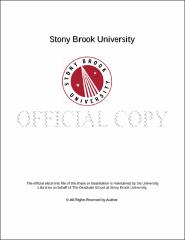| dc.identifier.uri | http://hdl.handle.net/11401/76606 | |
| dc.description.sponsorship | This work is sponsored by the Stony Brook University Graduate School in compliance with the requirements for completion of degree. | en_US |
| dc.format | Monograph | |
| dc.format.medium | Electronic Resource | en_US |
| dc.language.iso | en_US | |
| dc.publisher | The Graduate School, Stony Brook University: Stony Brook, NY. | |
| dc.type | Dissertation | |
| dcterms.abstract | In this dissertation I look for a way to capture respect and self-respect as freestanding political values, prizing respect apart from metaphysically weighty concepts of moral personhood. I do this because I think that concepts of respect and self-respect have an important role to play in political theory, independent of the work done by moral personhood arguments. A shift in our thinking about the meaning of respect might unlock new approaches to problems that bedevil political liberalism. Starting with a critical interpretation of Rawls's account of self-respect, this dissertation re-thinks the appraisal and recognition distinction that has dominated the literature on respect and self-respect since the 1970s. As an alternative, I offer an "empowerment" concept of respect, where a relation counts as respectful only when it serves (or would serve) to advance the normative power of the respected. By “normative power†I mean the leverage a person has to contribute to practices they have reason to value. I theorize respect as part of an ongoing process of normative empowerment that has distinct stages: crediting, reckoning, and accounting. With this conceptualization in hand, I work up an empowerment conception of self-respect. Could such a conception help produce an interpretation of Rawlsian liberalism that is better able to respond to those it marginalizes? Testing this idea, I use the empowerment conception to suggest adjustments to Rawls’s “justice as fairness†on behalf of disabled members of the community and their caregivers, as well as on behalf of religiously devout members of the polity. | |
| dcterms.available | 2017-09-20T16:50:47Z | |
| dcterms.contributor | Mar, Gary | en_US |
| dcterms.contributor | Kittay, Eva | en_US |
| dcterms.contributor | Khader, Serene | en_US |
| dcterms.contributor | O'Byrne, Anne | en_US |
| dcterms.contributor | Dillon, Robin | en_US |
| dcterms.contributor | . | en_US |
| dcterms.creator | O'Connor, Cara Watson | |
| dcterms.dateAccepted | 2017-09-20T16:50:47Z | |
| dcterms.dateSubmitted | 2017-09-20T16:50:47Z | |
| dcterms.description | Department of Philosophy | en_US |
| dcterms.extent | 277 pg. | en_US |
| dcterms.format | Application/PDF | en_US |
| dcterms.format | Monograph | |
| dcterms.identifier | http://hdl.handle.net/11401/76606 | |
| dcterms.issued | 2017-05-01 | |
| dcterms.language | en_US | |
| dcterms.provenance | Made available in DSpace on 2017-09-20T16:50:47Z (GMT). No. of bitstreams: 1
OConnor_grad.sunysb_0771E_13367.pdf: 1849227 bytes, checksum: 300c810b19414c40ff459b6ead7a849c (MD5)
Previous issue date: 1 | en |
| dcterms.publisher | The Graduate School, Stony Brook University: Stony Brook, NY. | |
| dcterms.subject | Darwall, empowerment, political liberalism, Rawls, respect, self-respect | |
| dcterms.subject | Philosophy -- Ethics | |
| dcterms.title | Empowerment Respect, Self-Respect, and Political Liberalism | |
| dcterms.type | Dissertation | |

